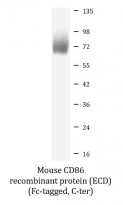ARG70339
Mouse CD86 recombinant protein (ECD) (Fc-tagged, C-ter)
Mouse CD86 recombinant protein (ECD) (Fc-tagged, C-ter) for Binding Activity,SDS-PAGE and Mouse
Overview
| Product Description | HEK293 expressed, Fc-tagged (C-ter) Mouse CD86 recombinant protein (ECD). |
|---|---|
| Tested Reactivity | Ms |
| Tested Application | Binding, SDS-PAGE |
| Target Name | CD86 (ECD) |
| Species | Mouse |
| A.A. Sequence | Val24 - Glu245 of Mouse CD86 (NP_062261.3) with an Fc tag at the C-terminus. |
| Expression System | HEK293 |
| Alternate Names | B70; B7.2; LAB72; CD antigen CD86; B7-2; FUN-1; CD28LG2; T-lymphocyte activation antigen CD86; CTLA-4 counter-receptor B7.2; Activation B7-2 antigen; BU63 |
Application Instructions
| Application Note | Binding activity test: Measured by its binding ability in a functional ELISA. Immobilized Recombinant Mouse CD86 at 2 µg/ml (100 µl/well) can bind Recombinant Human CTLA-4 with a linear range of 18-72 ng/ml. |
|---|
Properties
| Form | Powder |
|---|---|
| Purification Note | 0.22 µm filter sterilized. Endotoxin level is <0.1 EU/µg of the protein, as determined by the LAL test. |
| Purity | >97% (by SDS-PAGE) |
| Buffer | PBS (pH 7.4) |
| Reconstitution | Reconstitute to a concentration of 0.1 - 0.5 mg/ml in sterile distilled water. |
| Storage Instruction | For long term, lyophilized protein should be stored at -20°C or -80°C. After reconstitution, aliquot and store at -20°C for up to one month, at 2-8°C for up to one week. Storage in frost free freezers is not recommended. Avoid repeated freeze/thaw cycles. Suggest spin the vial prior to opening. |
| Note | For laboratory research only, not for drug, diagnostic or other use. |
Bioinformation
| Gene Symbol | CD86 |
|---|---|
| Gene Full Name | CD86 molecule |
| Background | This gene encodes a type I membrane protein that is a member of the immunoglobulin superfamily. This protein is expressed by antigen-presenting cells, and it is the ligand for two proteins at the cell surface of T cells, CD28 antigen and cytotoxic T-lymphocyte-associated protein 4. Binding of this protein with CD28 antigen is a costimulatory signal for activation of the T-cell. Binding of this protein with cytotoxic T-lymphocyte-associated protein 4 negatively regulates T-cell activation and diminishes the immune response. Alternative splicing results in several transcript variants encoding different isoforms. [provided by RefSeq, May 2011] |
| Function | Receptor involved in the costimulatory signal essential for T-lymphocyte proliferation and interleukin-2 production, by binding CD28 or CTLA-4. May play a critical role in the early events of T-cell activation and costimulation of naive T-cells, such as deciding between immunity and anergy that is made by T-cells within 24 hours after activation. Isoform 2 interferes with the formation of CD86 clusters, and thus acts as a negative regulator of T-cell activation. (Microbial infection) Acts as a receptor for adenovirus subgroup B. [UniProt] |
| Cellular Localization | Cell membrane; Single-pass type I membrane protein. [UniProt] |
| Calculated MW | 38 kDa |
| PTM | Polyubiquitinated; which is promoted by MARCH8 and results in endocytosis and lysosomal degradation. [UniProt] |
Images (1) Click the Picture to Zoom In






